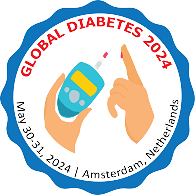Diabetes: Types and its Complications
Diabetes is a group of metabolic disorders characterized by high blood sugar levels over a prolonged period mainly due to insulin deficiency or resistance. Symptoms of high blood sugar include frequent urination, increased thirst, increased hunger, and weight loss. High levels of glucose in blood leads to a chronic condition called diabetes mellitus. High glucose in blood may cause severe damage to vital organs.
-
Cardiac Complications
-
Renal Complications
-
Renal Complications
-
Ear & Eye Complication
Type I and Type II Diabetes
Type 1 Diabetes mellitus (otherwise called type 1 diabetes) is a type of diabetes mellitus that outcomes from the immune system annihilation of the insulin-delivering beta cells in the pancreas. Type 2 diabetes is a long haul metabolic turmoil that is portrayed by high glucose, insulin resistance, and relative absence of insulin. Basic side effects incorporate expanded thirst, incessant pee, and unexplained weight reduction.
-
Prediabetes
-
Type 1 Diabetes Mellitus
-
Type 2 Diabetes Mellitus
-
Gestational Diabetes
-
Neonatal Diabetes
-
Steroid-induced diabetes
-
β-cell Dysfunction
-
Insulin Deficiency
Gestational Diabetes (GDM)
Gestational diabetes is developed during pregnancy (gestation). Like other types of diabetes, gestational diabetes affects the usage of glucose by cells. High blood sugar can be caused by gestational diabetes and this can affect the pregnancy and the health of baby. Gestational diabetes can be controlled by women by eating healthy foods, exercising and taking medication if necessary. Controlling blood sugar can prevent a difficult birth and can keep both the mother and baby healthy.
-
Excessive birth weight
-
Early (preterm) birth and respiratory distress syndrome
-
Low blood sugar (hypoglycemia)
-
Type 2 diabetes
-
High blood pressure and preeclampsia
Diabetic Foot and Diabetic Eye Problems
Often, raised blood glucose is capable of damaging the sensation in the feet, affecting blood circulation to the area without which there usually tends to be delay in healing of the cuts and sores. Diabetic retinopathy is caused because of injury to the blood vessels within the tissue of tissue of retina. Poor management of glucose is one of the risk factors. The blood vessels might swell and leak fluid and abnormal development of new blood vessels on the surface of the tissue layer is seen.
-
Diabetic Foot ulcers
-
Diabetic Foot Amputation
-
Diabetic Foot Pain
-
Charcot’s foot
-
Gangrene
-
Miscellaneous Diabetic Foot Damage
-
Footcare in Diabetes
Osteomyelitis and Pathophysiology
Osteomyelitis is inflammation of the bone caused by an infecting organism. Although bone is normally resistant to bacterial colonization, events such as trauma, surgery, the presence of foreign bodies, or the placement of prostheses may disrupt bony integrity and lead to the onset of bone infection.
-
Fever
-
Swelling, warmth and redness over the area of the infection
-
Pain in the area of the infection
-
Fatigue
Endocrinology and Endocrine Disorders
Endocrinology is the branch of biology that deals with the study of the endocrine system, hormones, and its disorders. Clinical Endocrinology and metabolism is a field of medicine; more precisely a sub-specialty of internal medicine, which mainly deals with the investigation and management of sicknesses related to hormones. When the hormone exits the gland they reach the bloodstream and are moved to organs and tissues in every part of the body. Endocrinology also concentrates on the endocrine glands and tissues that secrete hormones. The human endocrine system comprises of several glands.
-
Endocrinology and Metabolism
-
Metabolic Syndrome
-
Metabolic Disorders
-
Molecular Endocrinology
-
Endocrine Disorders
Molecular and Cellular endocrinology
Essentially it meets to mysteries the combination of extracellular (hormones, synapses) and to the comprehension of cell administrative components associated with hormonal control and furthermore the hormonal control of separation, hormone controlled quality articulation. It likewise created hereditary and biochemical impacts.
-
Mechanisms of action of extracellular signals (hormones, neurotransmitters)
-
Clinical and translational studies related to endocrinology
Obesity and Weight Management
Nutrition is fundamental for optimal health and growth. Food plays a major role in both health and disease. It is important to promote healthy nutrition in all age groups with the current increase in lifestyle disorders around the world. It's not just for an individual but for the entire population to improve eating habits. Particularly under nutrition is harmful in early age group i.e. childhood and over nutrition in adulthood but after years both forms are likely to affect all age groups in future.
-
Weight loss Medications
-
Dietary and Lifestyle changes
-
Metaflammation
Metabolic Syndrome and Therapeutics
Metabolic syndrome is the name for a group of risk issues that raises your risk for heart disease and other health problems, such as diabetes and stroke. The term "metabolic" refers to the biochemical processes involved in the body's normal running. Risk factors are qualities, conditions, or habits that increase your chance of developing a disease. Most of the disorders associated with metabolic syndrome don't have obvious cyphers or symptoms. One sign that is visible is a large midriff circumference. Risk factors associated with metabolic syndrome.
-
Diagnosis, treatments and medications
-
Nursing care and Paediatric
Ketosis and Diabetic Ketoacidosis
Ketosis and ketoacidosis both involve the production of ketones in the body. However, while ketosis is generally safe, ketoacidosis can be life-threatening. Ketoacidosis occurs when the body produces dangerously high levels of ketones, and it is often a complication of type 1 diabetes.
-
Nausea and vomiting
-
Stomach pain
-
Trouble breathing
-
Loss of consciousness
-
Rising levels of ketones in the urine
-
Thirst and frequent urination
-
Exhaustion
Diabetic Retinopathy and Nephropathy
Diabetic nephropathy is a disease/ the damage caused by diabetes to your kidney, which in some sever cases can lead to kidney failure. The waste from our blood is filtered by tiny blood vessels present in our kidney, and they can be destroyed by high sugar level in our body. The body retains excess salts and water than required leading to weight gain and ankle swelling. Diabetes may also lead to damage to nerves, which can lead to difficulty in emptying bladder and creating pressure injuring your kidney. Long-time retention of urine in bladder leads to infections as bacterial growth in urine with high blood sugar level is high. About 10 to 40 % of those with Type 2 diabetes and 30% of patients with Type 1 diabetes gradually will suffer from kidney failure.
-
Microalbuminuria
-
Microalbuminuria
-
Albumin
-
Nephropathy
-
Proteinuria
Nutrition and Healthy diet
Does "diet" promptly make you think about a terrible weight reduction routine? In the event that it did, you are most likely not the only one. For instance, consider the utilization of the expression "diet" in advertising sustenance items it, for the most part, portrays nourishments low in calories. However, there is another sign of this word. Diet can likewise allude to the nourishment and drink an individual devours day by day and the psychological and physical conditions associated with eating. Nutrition involves more than basically eating a "decent" diet it is about sustenance on each dimension. It includes associations with family, companions, nature (the earth), our bodies, our locale, and the world.
-
Fresh fruits
-
Fresh vegetables
-
Whole grains
-
Legumes
-
Nuts
-
Lean proteins
Insulin Analogues and Glucose Sensors
Insulins are categorized by differences in onset, peak, duration, concentration, and route of delivery. An analog refers to something that is “analogous” or similar to something else. Therefore, “insulin” analogs are analogs that have been designed to mimic the body's natural pattern of insulin release.
-
Insulin antibodies
-
Insulin dose
-
Injection site
-
Injection technique
-
Exercise
-
Temperature
Stroke, Hypertension and Cardiovascular Diseases
Hypertension is the most predominant and ground-breaking modifiable hazard factor for stroke. People with hypertension are around 3 or multiple times bound to have a stroke. Hypertension remains the absolute most significant modifiable hazard factor for stroke, and the effect of hypertension and nine other hazard factors together represent 90% everything being equal. The risk of CVD mortality in type 2 diabetic patients is more than double compared with that in age-matched subjects. Stroke events and all manifestations of CHD, myocardial infarction (MI), sudden death, and angina pectoris is at least twofold more common in patients with type 2 diabetes than in non-diabetic individuals.
-
High Blood Glucose
-
Damage of Blood Vessels
-
Atherosclerosis and Hypertension
-
Shortness of Breath
-
Diabetic Neuropathy
Genetics and Thyroid Disorders
The butterfly shaped gland located at the base of neck at Adams apple is called as thyroid. It is a part of the endocrine system, which is responsible to co-ordinate many body’s activities. Thyroid glands produce androgen prohormones which regulates the body’s metabolism. Thyroid diseases are mostly affects women than men. In women infertility, problems during pregnancy, miscarriage, menstrual period and childbirth.
-
Restlessness
-
Nervousness
-
Racing heart
-
Irritability
-
Increased sweating
-
Shaking
-
Thin skin
-
Weight loss
Diabetes in Children and Teens
Type 1 diabetes in children is a condition in which your tyke's body never again delivers a vital hormone (insulin). Your kid needs insulin to endure, so you'll need to supplant the missing insulin. Type 1 diabetes in youngsters used to be known as adolescent diabetes or insulin-subordinate diabetes. The determination of sort 1 diabetes in kids can be overpowering at first. Abruptly you and your tyke relying upon his or her age must figure out how to give infusions, tally starches and screen glucose.
-
Diabetes type one
-
Childhood diabetes
-
Monogenic forms of diabetes
Herbal and Natural therapies in Diabetes
Apple Cider Vinegar: The primary compound in ACV is acetic acid and is believed to be liable for many of its health benefits Taking 2 tablespoons before bedtime can reduce your morning fasting sugar levels
Fiber and Barley: Eating fiberdrops blood sugar and insulin concentrations. The recommended volume of fiber is around 30 grams per day.
Chromium: Mainly found in brewer’s yeast, scarcity in chromium injuries the metabolism of glucose.
Zinc: Those with diabetes are usually found to be zinc deficient. Studies have shown zinc supplementation can reduce blood sugar and A1C, have an antioxidant effect, low blood sugar and even help treat some of the complications related to diabetes.
Aloe Vera: The sap of aloe vera is known for its purge effect. Therefore, validate to get the juice of the gel! There is increasing suggestion for use of the gel, which is the mucilaginous material inside the leaves.
Insulin Devices and Diabetes Medications
Diabetes is mostly caused due to lack of insulin production in the body hence insulin is administered externally. There are many number of types of insulin based on the time taken to act. Insulin is injected to the people who have difficulty in controlling the diabetes with oral medications.
-
Rapid-acting insulin
-
Short-acting insulin
-
Intermediate-acting insulin
Hyperglycemia and Hypoglycemia
Hyperglycemia occurs when blood sugar levels are too high. People develop hyperglycemia if their diabetes is not treated properly. Hypoglycemia sets in when blood sugar levels are too low. If blood sugar levels are too low, it is called hypoglycemia.
-
Shaking, sweating, or clammy skin
-
Sudden nervousness, confusion, headache, or irritability
-
Rapid heart rate
-
Dizziness, weakness, or fatigue
-
Hunger and nausea
Pancreas and Islet Cell Transplantation
Islet transplantation is the transplantation of isolated islets from a donor pancreas into another person. It is an experimental treatment for type 1 diabetes mellitus. Once transplanted, the islets begin to produce insulin, actively regulating the level of glucose in the blood.
-
Pancreatic cancer
-
Pancreatitis
-
Pancreatic pseudocyst
-
Enlarged pancreas
Biomarker for Diabetes
Molecular Biomarkers can be demarcated as “a characteristic that is accurately measured and gauged as an pointer of normal biological procedures, pathogenic procedures, or pharmacologic responses to a pharmaceutical intervention. Biomarkers play a vital part in leading clinical trials and treating patients. Advances in molecular diagnostics help medical professionals make knowledgeable, scientifically valid decisions. More well-organized discovery and usage of biomarkers in the growth of antidiabetes drugs will depend on accelerating our understanding of the pathogenesis of diabetes and specifically its macrovascular complications.
-
Biomarkers of vascular function in diabetes
Clinical Research and Medical Case Reports
Diabetes case reports are in-depth inquiries of an individual or a group of people suffering with diabetes. The data is collected from various places by various methods. The case study technique encompasses spotting, or reconstructing ‘the case history’ of a single participant or group of individuals, i.e. the idiographic approach. Case studies permit an investigator to investigate a topic in detailed and minute manner. The case study is not a research method, but a method of data collection and analysis that will generate material suitable for case studies.
Related Societies:
USA: American Association of Diabetes Educators | American Diabetes Association | Canadian Diabetes Association | American Association for Clinical Endocrinology | Diabetes Canada
Europe: European Society of Endocrinology | Central European Diabetes Association | FAND - Italian Association of Diabetics | Italian Association for the Defence of the Interests of Diabetics | International Diabetes Federation- Italy
Asia-Pacific: Australian Diabetes Society | Asian Association for the Study of Diabetes | Diabetes Association of Nigeria | Diabetes Association of the Republic of China | Asian Diabetic Association











